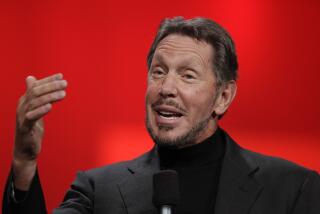Oracle CEO Larry Ellison makes Malibu real estate his own
On busy Pacific Coast Highway in Malibu, some well-kept facades conceal a secret.
Behind the Mediterranean with wooden doors, the white stucco two-story with a red tile roof, the long wall obscuring a three-structure compound, hides a singular, massive wealth fueled by obsession.
This is Larry Ellison territory, where a Bay Area billionaire with seemingly endless patience and resources is buying up the best spots along Malibu’s 21 miles of coast.
PHOTOS: Expensive things Ellison has bought
The Oracle Corp. chief executive has bought nearly two dozen properties in the beach community, according to a public records search conducted for The Times by PropertyShark.com.
Ellison has spent an estimated $200 million to $250 million through at least nine purchases, in one case of multiple homes, on coveted Carbon Beach. Along the way, the software tycoon dropped millions on a wooded estate near the Franciscan friars in gated Serra Retreat. He also has bought an inland tennis club, Casa Malibu Inn and coastal restaurant property.
More purchases could be veiled behind a maze of limited liability companies — a false front popular with the rich and famous — but area real estate agents who have followed the deals believe the number is accurate.
The decade-long shopping spree in Malibu represents just the tip of Ellison’s trophy-property iceberg.
Ranked as the third-richest person nationwide by Forbes magazine, with a fortune estimated at $43 billion, Ellison owns multiple estates in Northern California and several Lake Tahoe houses. His Rancho Mirage mansion sports a golf course. Last year he bought most of the Hawaiian island of Lanai for more than $500 million.
But why the laser focus in Malibu?
The notoriously press-shy Ellison declined to comment on his real estate purchases. The tech titan, who came from modest circumstances and derives most of his fortune from the Redwood City, Calif., software company he co-founded, has described himself as an amateur architect who loves to tinker with houses as a hobby.
“When I was a kid, the first thing I ever wanted to be was an architect,” Ellison said in a rare interview last fall with CNBC. “So I love building houses, remodeling houses, designing houses, converting houses.”
His real estate agent said the attraction to Malibu is simple. The beautiful stretch of coast draws visitors from around the globe, is close to the entertainment capital of the world and enjoys moderate weather year-round.
“There are only so many seats in the front row,” said Kurt Rappaport, co-founder of Westside Estate Agency.
“If you take the best section and the most prime property, that’s inherently a great investment,” Rappaport said. “That’s what Larry recognized and sees.”
Vision and timing have enabled Ellison to accrue a collection of properties that would be difficult to replicate today.
Ellison’s sweet spot lies within the crescent-shaped swath of 70 or so home sites along Carbon Beach, where he rubs suntanned elbows with the likes of entertainment mogul Jeffrey Katzenberg and former Dodgers CEO Jamie McCourt.
Along the 1.5-mile stretch known as “billionaires’ beach,” the roar of the crashing waves on one side of the homes is matched on the other side by the hum of vehicles on well-trafficked PCH. Plainclothes security keeps a watchful eye on the comings and goings here.
A recent purchase was a three-structure copper-roofed compound that Ellison bought last year for $37 million from former Yahoo Inc. CEO Terry Semel and his wife, Jane.
Word among the neighbors is that Ellison is doing a variety of things with his Carbon Beach collection.
He has bought houses, kept them up, leased them out, sold some, redone others and fixed one up for use by his children, said Jack Heidt, whose family had a 1926 weekend home there for 60 years before selling five years ago. “He has been very good for Carbon Beach.”
The bulk of Ellison’s Carbon Beach homes were bought in the $10-million to $17-million range from fellow billionaires.
“People initially thought the prices we paid were high,” Rappaport said. “Now you look back and they are great values.”
A buyer with a net worth of $43 billion is not price-sensitive, said Jan Brzeski, portfolio manager for Arixa Capital, which makes loans on prime-location homes being renovated for resale. A house on Carbon Beach, he said, “is worth what Larry Ellison thinks it is worth.”
And as a hedge against inflation, real estate is a good place to park his money. The super-wealthy often collect high-end real estate, but Ellison’s focus in Malibu is unusual in its intensity.
Billionaire medical research entrepreneur Patrick Soon-Shiong, for instance, has been buying ranch homes in a Brentwood neighborhood since 2006 at $5 million or so a pop. His spending barely compares.
Ellison is far from a typical profit-chasing real estate investor, said Greg Hebner, principal at Los Angeles-based Arixa. “He makes these investments because he enjoys it.”
By controlling the supply of houses on Carbon Beach, Ellison is creating an exclusivity that is likely to drive up prices in the next few years, Hebner said. “He’s creating value for the other homeowners too.”
In other words, Ellison is to Malibu real estate what De Beers is to diamonds.
Ellison also has tried his hand at commercial development, creating the sleek beachfront perch for celebrity-friendly sushi spot Nobu Malibu.
He bought the beachfront restaurant site in 2004 for $17.6 million, and after two years of construction, Nobu opened there last year. Ellison, a Japanophile and tennis fanatic, likes the franchise so much that he has announced plans for a Nobu at one of his desert properties — the expanded Indian Wells Tennis Garden.
No tenant has been named for the restaurant site that Ellison owns adjacent to Nobu Malibu.
Although Malibu has become more trendy in recent years, with designer clothing stores outnumbering T-shirt shops, Rappaport said Ellison’s goal is to enhance the community and maintain its essence.
“The unspoiled nature of Malibu is what he loves,” Rappaport said. “He has under-built what he could, being respectful of the charm.”
The city purposefully tries to keep Malibu as rustic as possible despite the proliferation of high-end retailers and restaurants. A case in point: Access to Ellison’s Malibu Racquet Club, upgraded since his 2007 purchase and set behind decorative metal gates, is via a narrow and bumpy public road — more “Beverly Hillbillies” than Beverly Hills.
His Casa Malibu Inn, bought six years ago for $20 million, hasn’t been updated since it was built in 1950, although remodeling plans are in the works.
With billionaires and millionaires prominent in Malibu, the gulf between the haves and have-nots is wide. Not everyone is overjoyed with Ellison’s land grab or feels enriched by it.
Tremendous wealth “is something to fear,” said a local merchant who declined to give his name because wealthy landowners are among his clientele. “It don’t trickle down.”
Malibu Mayor Lou La Monte, a 22-year resident, likes the changes he has seen with the opening of Nobu and the refurbished tennis club. He doesn’t see Ellison’s commercial projects as responsible for the city’s upscale shift.
“This isn’t the kind of a town that is influenced by individual pieces of commercial development,” La Monte said. The mayor does credit Ellison’s buying binge with keeping home values up on Carbon Beach.
Ellison has kept a low profile locally, La Monte said, and has had no issues with the city. Building permits show remodeling at several of the properties, including the addition of a koi pond at a Carbon Beach house.
In his CNBC interview, Ellison shared plans for one of his Malibu sites. As with homes in Japan and Rhode Island, Ellison said, he wants to build a small art museum.
Therein may lie a clue. Houses are bought and sold, changing hands again when an owner dies. Museums can be a lasting legacy.
Perhaps what is driving Larry Ellison is his own mortality.
More to Read
Inside the business of entertainment
The Wide Shot brings you news, analysis and insights on everything from streaming wars to production — and what it all means for the future.
You may occasionally receive promotional content from the Los Angeles Times.











